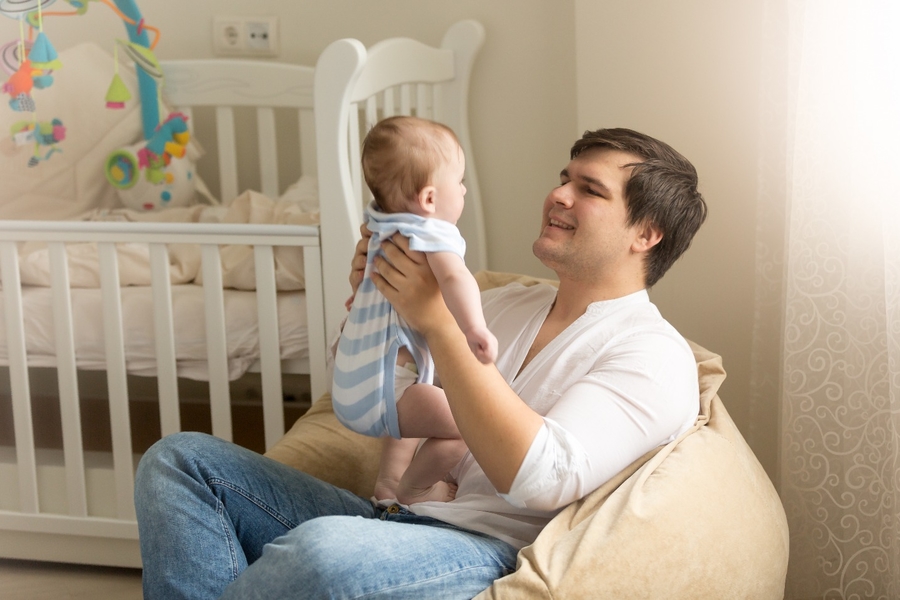
Papa Has Baby Blues: Dealing With Postnatal Anxiety in Dads
12 Apr 2017 | 4 min Read
Preeti Athri
Author | 117 Articles
We always associate the baby blues with new mums, but not many of us know that many new dads suffer from postnatal anxiety as well. Now you’re probably thinking, ‘Huh? How on earth could dads suffer from postnatal depression?’
A lot of studies lately have found that fathers too, get affected by childbirth and exhibit symptoms of anxiety that are quite similar to those of new mums. These symptoms can often be mistaken for just stress, but just like maternal postnatal depression, if symptoms of paternal anxiety are ignored, the consequences could affect the dad’s psychological health.
How do dads get baby blues in the first place?
While the mums undergo an ocean of physical and mental changes through pregnancy, delivery and motherhood, dads experience stress of a different kind. The extra financial burden, new responsibilities, self-doubt about being a good parent, changes in his relationship with his wife, change in routine because of the baby; all these can take a toll on the new dad’s emotional health. Fathers are also overwhelmed with the huge change a baby brings. Factors such as living in a nuclear family adds to the stress as it means the new mum and dad get limited help and support from external family.
How can one point out signs of paternal depression?
There’s a difference between being plain unhappy and being depressed. Symptoms of postnatal depression in dads occur gradually, and get worse with time.Studies say about 1 out of 10 first-time dads suffer from paternal depression. The symptoms might appear within a few days after the baby’s birth or even after 3 to 6 months. Pointing out signs of paternal depression is tough, as no one expects first-time dads to be anything but a bit busy or tired.
Here are few indicators of depression in new dads that you need to look out for –
Changes in sleep patterns: Depressed dads may be unable to sleep even if they are tired. On the other hand, some dads might find themselves sleeping much more than normal.
Feels withdrawn: If the dad feels completely withdrawn from his spouse, family or friends or even the baby, he might be experiencing anxiety. To stay away from interaction, he may even immerse himself in his work for long hours.
Changes in appetite: From no hunger to unexplained gluttony – anxiety could lead to drastic changes in appetite.
Frequent aches and pains: Lasting exhaustion, headaches and body pain are also symptoms of depression, often dismissed as signs of being tired.
Irritability and anger: Feeling irritated because of exhaustion is normal, but if the irritation leads to strong temper outbursts and violent behaviour, then the dad needs help.
Feels worthless: Feeling unimportant and having suicidal thoughts also is a red flag to watch out for.
Turns to alcohol: Overwhelmed by the change, anxious dads may turn to drugs, gambling or alcohol. It does not mean having the occasional drink, it means indulging regularly to get away from reality.
Dealing with depression
Talk about it: Sounds basic, but this is important. The first step to dealing with postnatal depression is talking about it. Quite often, dads don’t acknowledge that they’re anxious as they feel they should be ‘sucking it up’. Since the new mum herself undergoes several emotional changes post pregnancy, confiding only in her might not help. Talking to family and friends along with the spouse, for emotional support can make a huge difference to these dads.
Bust the stress: Just like new mums, the new daddy can indulge in a sport, start an exercise routine (yoga is always recommended) and eat healthy to beat the stress. Indulging in an activity he loves (I know a friend whose husband started painting to relax once the baby was born) could also help him open up.
Get help: Getting help from a doctor is a wise thing to do. The doctor might ask the dad to take some medication depending on the symptoms. It’s always better to nip symptoms of anxiety in the bud before it snowballs into severe depression.
Parenting is tough work and it’s important for both parents to be emotionally healthy to raise a healthy and happy child. So talk it out, get help and stay healthy.
Explore the entire collection of articles: Daddys Day
If you are reading this article on our website and have an Android phone, please download our APP here for a more personalised experience based on your lifestage.
A


Suggestions offered by doctors on BabyChakra are of advisory nature i.e., for educational and informational purposes only. Content posted on, created for, or compiled by BabyChakra is not intended or designed to replace your doctor's independent judgment about any symptom, condition, or the appropriateness or risks of a procedure or treatment for a given person.
